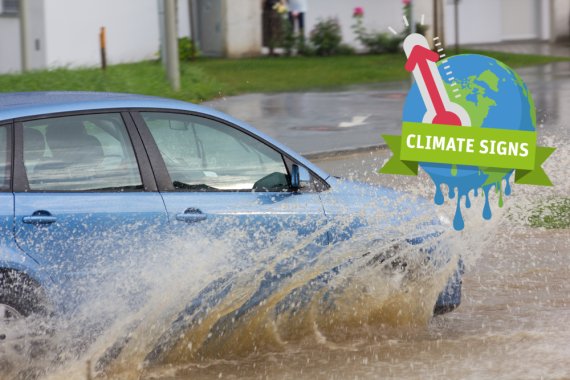| "Climate Signs" | Climate change is not about the future — it is happening now and we can already see the effects. In its ‘Climate Signs’ series, Resource will be looking over the summer at how climate change affects people’s daily lives all around the world and what WUR researchers are doing about this issue. |
|---|
To what extent does climate change affect high water?
‘That is difficult to determine, since extremes can also occur when climate change is not at play. However, the climate can certainly influence high water. A well-known phenomenon is the rising sea level due to the melting ice caps on land masses. In addition, rivers can overflow through a combination of rain and meltwater from glaciers. At higher temperatures, more seawater evaporates, which leads to more water vapour in the atmosphere. When that water condenses, heavier showers occur. Since sewers are not designed to handle these, the lower parts of urban areas can get flooded. Such heavy showers in the Netherlands seem to occur more often in recent years.’

Over the last 50 years, rainfall in the Netherlands has increased by around 25 percent.
Judith Klostermann, senior researcher at Wageningen Environmental Research
But aren’t the summers getting drier?
‘Climate change leads to more overall rainfall in the Netherlands. Over the last 50 years, it has increased by around 25 percent. However, the precipitation is dispensed in shorter periods of time. When it rains, it rains hard, and the dry spells in between are becoming longer. This new precipitation pattern means that Dutch water management is in dire need of a revision. It is important that we pay attention not only to the drainage of water but also to its retention. That is why the water boards are investing in additional water storage in the countryside and cities.’
What are the consequences?
‘Floods in the Netherlands usually involve short-term flooding, with 10 to 20 centimetres of water flowing through houses. In addition to the economic damage, this type of flooding can also cause damage to the agricultural harvest. Flooding seawater can also affect trees and plants and render agricultural land unusable for some time. That was the case in Zeeland in 1953, for example. Farmers in that region were only able to resume farming after several years. However, there is also a positive side to it. Floodwater supplies sludge, which raises the land and fertilises it.’
Can people contribute at home?
‘Yes, tiling in the garden inhibits water drainage. Making gardens greener helps to improve water drainage. In addition, disconnecting rain pipes from the sewer and letting the water run into the garden also has a beneficial effect. This results in a lower burden for sewage treatment and the groundwater gets replenished, thus creating a larger buffer for dry times.’
I suspect that the high-water threat will become more frequent.
What are the expectations for the next 50 years?
‘If we study the last centuries of Dutch history, we see that massive flooding from the sea and rivers has occurred every 50 years. I suspect that the high-water threat will become more frequent. However, actual flooding will occur less frequently thanks to the countermeasures taken by the Netherlands. But we will have to deal with heavy showers more often due to global warming. For each degree the Earth warms up, the amount of precipitation in short, heavy showers can increase by 10 to 15 percent. In combination with the increasing drought, this can lead to more flooding. Dehydrated soil cannot absorb as much water. In other words, the next flood threat comes from above.’
Additional reading:
Massive die-off of cockles in the Wadden Sea
Drought: will quinoa replace potatoes?
Increased heat stress in Dutch cities
From giant ticks to super-ants: invasive species are on their way

